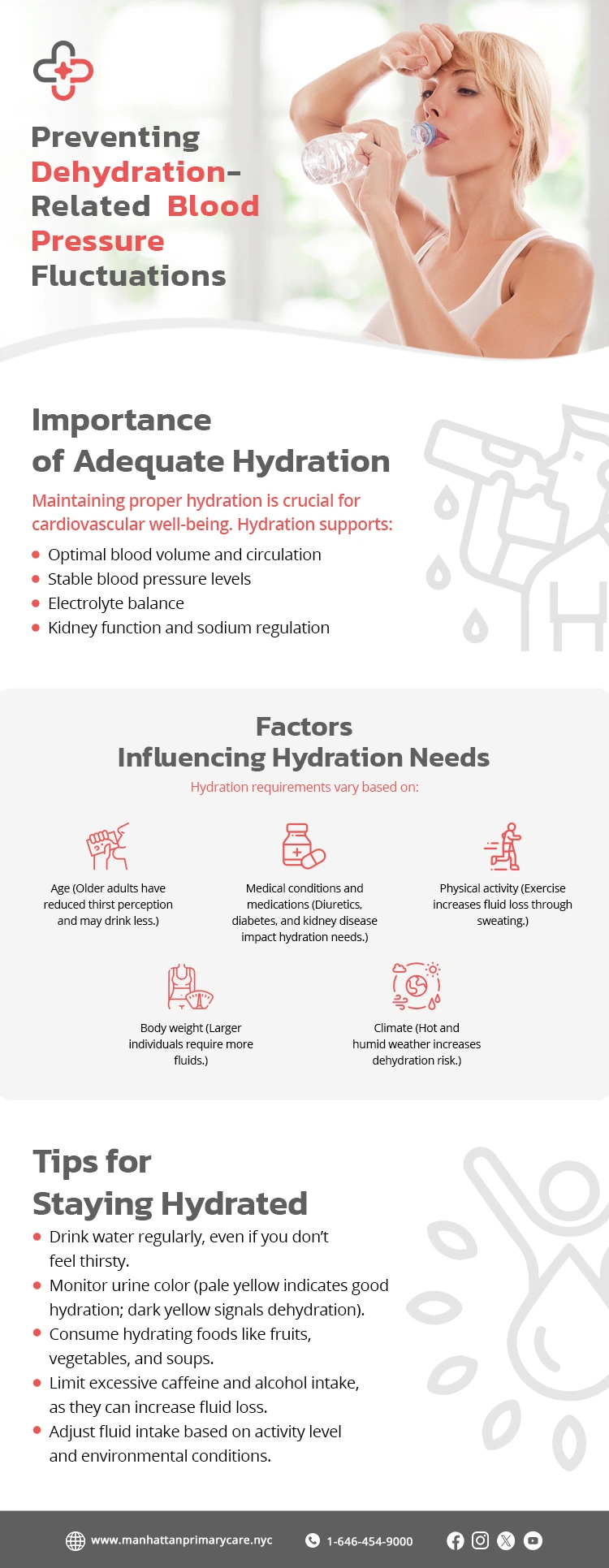Hydration plays a fundamental role in regulating blood pressure and overall cardiovascular health. Despite this, dehydration is often overlooked as a contributing factor to blood pressure fluctuations. The body’s circulatory system relies on an adequate fluid balance to maintain normal blood volume, efficient circulation, and proper electrolyte balance. When dehydration occurs, it can lead to a cascade of physiological changes, including low blood volume, blood vessel constriction, and increased secretion of vasopressin, all of which can contribute to high blood pressure (hypertension).
What Is Dehydration?
Dehydration occurs when the body loses more fluids than it takes in, leading to an insufficient amount of water to sustain normal physiological functions. Dehydration can range from mild to severe:
- Mild dehydration: A slight fluid deficit that may cause thirst and minor fatigue.
- Moderate dehydration: A more significant fluid loss that affects cognitive and physical performance.
- Severe dehydration: A life-threatening condition that can lead to organ failure, hypotension, and shock.
The body continuously loses fluids through processes such as sweating, urination, and respiration. Factors like hot weather, intense physical activity, illness, and diuretic medications can increase fluid loss, making dehydration more likely.
Common Symptoms of Dehydration
Recognizing dehydration early is crucial for preventing complications. Common symptoms include:
- Dry mouth and increased thirst
- Fatigue and weakness
- Dizziness or lightheadedness
- Dark yellow urine or decreased urination
- Rapid heartbeat and palpitations
- Confusion or irritability
Symptoms may vary based on age, physical activity, and underlying medical conditions. Older adults and individuals with chronic illnesses are more susceptible to dehydration-related complications.
The Relationship Between Dehydration and Blood Pressure
How Dehydration Affects Blood Volume
Blood volume is essential for maintaining stable blood pressure. When dehydration reduces blood volume, the heart must work harder to circulate blood, increasing cardiovascular strain. Additionally, the body releases vasopressin (antidiuretic hormone) to retain water, which also contributes to blood vessel constriction, further elevating blood pressure.
Impact on Blood Pressure
Dehydration can cause:
- Temporary increases in systolic and diastolic blood pressure due to blood vessel constriction and increased heart rate.
- Low blood pressure in some cases, particularly in individuals with existing cardiovascular conditions or severe dehydration.
Dehydration Leading to High Blood Pressure
Chronic dehydration may be a contributing factor to persistent hypertension. Research suggests that prolonged dehydration can:
- Increase blood viscosity, making it harder for blood to flow smoothly through vessels.
- Elevate stress hormone levels, such as cortisol, which can contribute to hypertension.
- Impair kidney function, leading to sodium retention and increased blood pressure.
Long-term dehydration can exacerbate cardiovascular disease risk, making proper hydration essential for blood pressure management.
Dehydration Leading to Low Blood Pressure
In some cases, dehydration can cause low blood pressure (hypotension), particularly in individuals who experience postural hypotension (orthostatic hypotension). This condition occurs when standing up too quickly causes dizziness or fainting due to a sudden drop in blood pressure. Severe dehydration can lead to dangerously low blood pressure, organ damage, and even shock, necessitating immediate medical intervention.
Preventing Dehydration-Related Blood Pressure Fluctuations


Importance of Adequate Hydration
Maintaining proper hydration is crucial for cardiovascular well-being. Hydration supports:
- Optimal blood volume and circulation
- Stable blood pressure levels
- Electrolyte balance
- Kidney function and sodium regulation
Factors Influencing Hydration Needs
Hydration requirements vary based on:
- Age (Older adults have reduced thirst perception and may drink less.)
- Body weight (Larger individuals require more fluids.)
- Physical activity (Exercise increases fluid loss through sweating.)
- Climate (Hot and humid weather increases dehydration risk.)
- Medical conditions and medications (Diuretics, diabetes, and kidney disease impact hydration needs.)
Tips for Staying Hydrated
- Drink water regularly, even if you don’t feel thirsty.
- Monitor urine color (pale yellow indicates good hydration; dark yellow signals dehydration).
- Consume hydrating foods like fruits, vegetables, and soups.
- Limit excessive caffeine and alcohol intake, as they can increase fluid loss.
- Adjust fluid intake based on activity level and environmental conditions.
When to Seek Medical Attention
Signs of Severe Dehydration
Severe dehydration requires immediate medical attention. Warning signs include:
- Extreme thirst and dry skin
- Rapid heartbeat and low blood pressure
- Confusion or unconsciousness
- Fainting or dizziness when standing
- Minimal urination or dark-colored urine
Consulting Healthcare Providers
Individuals experiencing frequent dehydration-related blood pressure changes should consult a healthcare provider. Proper blood pressure monitoring, hydration assessment, and routine health screenings can help identify underlying health concerns and guide effective treatment.
Conclusion
Hydration plays a vital role in cardiovascular health and blood pressure regulation. While dehydration can contribute to temporary and chronic high blood pressure, it can also lead to low blood pressure in some cases. Maintaining proper hydration through adequate water intake and electrolyte balance is essential for preventing blood pressure fluctuations and supporting overall well-being. If persistent blood pressure irregularities occur, seeking medical advice is recommended to ensure appropriate diagnosis and treatment.
Frequently Asked Questions
Can Dehydration Affect Heart Rate Along with Blood Pressure?
Yes, dehydration can lead to an increased heart rate (tachycardia). When the body loses fluids, blood volume decreases, making the heart work harder to circulate blood. This can result in palpitations and an elevated heart rate, alongside blood pressure fluctuations.
Is Dehydration More Likely to Cause High or Low Blood Pressure?
It depends on the severity and individual health conditions. Mild to moderate dehydration can cause high blood pressure due to blood vessel constriction and increased heart workload. However, severe dehydration can lead to dangerously low blood pressure (hypotension), resulting in dizziness, fainting, or even shock.
Can Drinking Too Much Water Lower Blood Pressure Too Much?
Yes, excessive water intake can dilute sodium levels in the blood (a condition called hyponatremia), leading to low blood pressure. This can cause symptoms such as dizziness, confusion, and, in severe cases, seizures or coma. Maintaining a balanced intake of fluids and electrolytes is crucial.
Are Certain People More Susceptible to Dehydration-Induced Blood Pressure Changes?
Yes, older adults, individuals with kidney disease, diabetics, those on diuretic medications, and people living in hot climates or engaging in intense physical activity are at a higher risk of dehydration-related blood pressure fluctuations.
How Quickly Can Dehydration Impact Blood Pressure?
The effects of dehydration on blood pressure can occur within hours, especially in hot weather or after vigorous exercise. Even mild dehydration can lead to noticeable changes in circulation and heart function, while chronic dehydration may contribute to long-term hypertension.
Disclaimer
This blog is for informational & educational purposes only and does not intend to substitute any professional medical advice or consultation. For any health-related concerns, please consult with your physician, or call 911.
